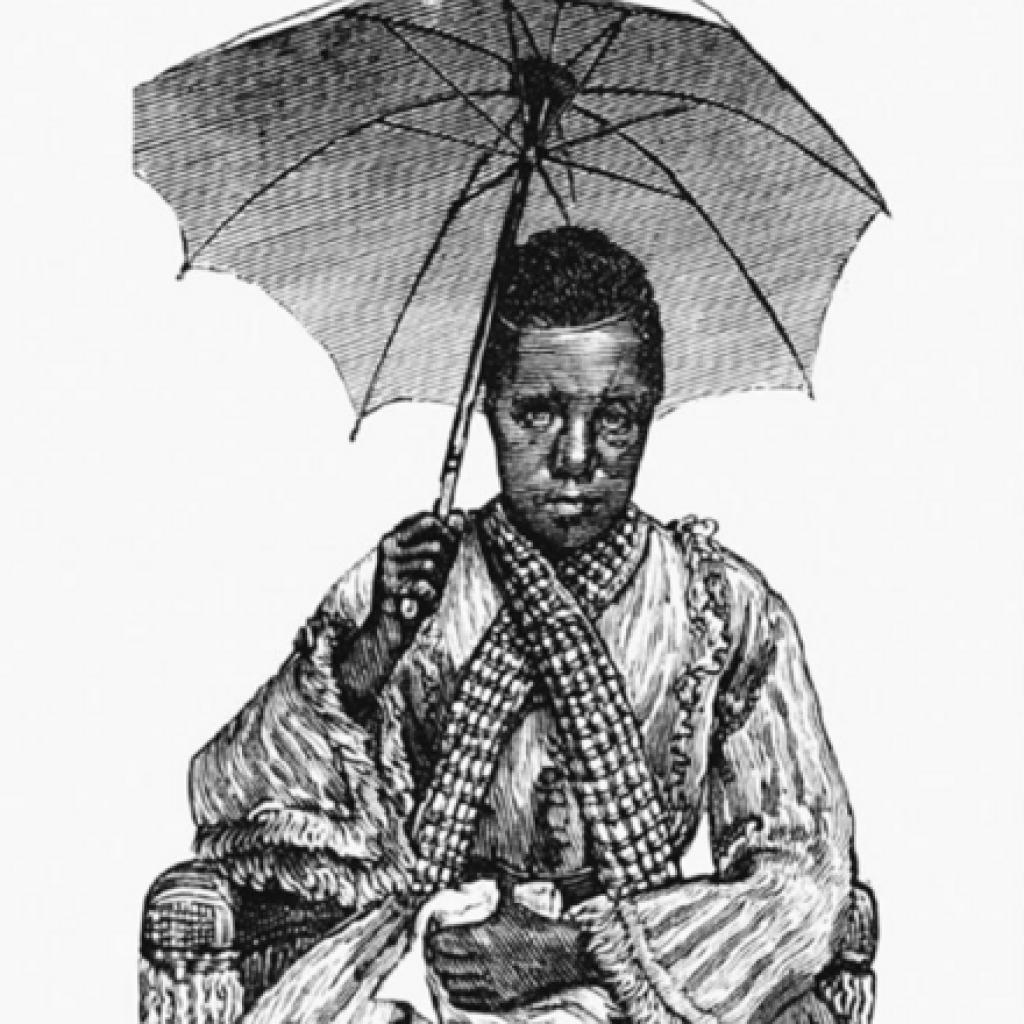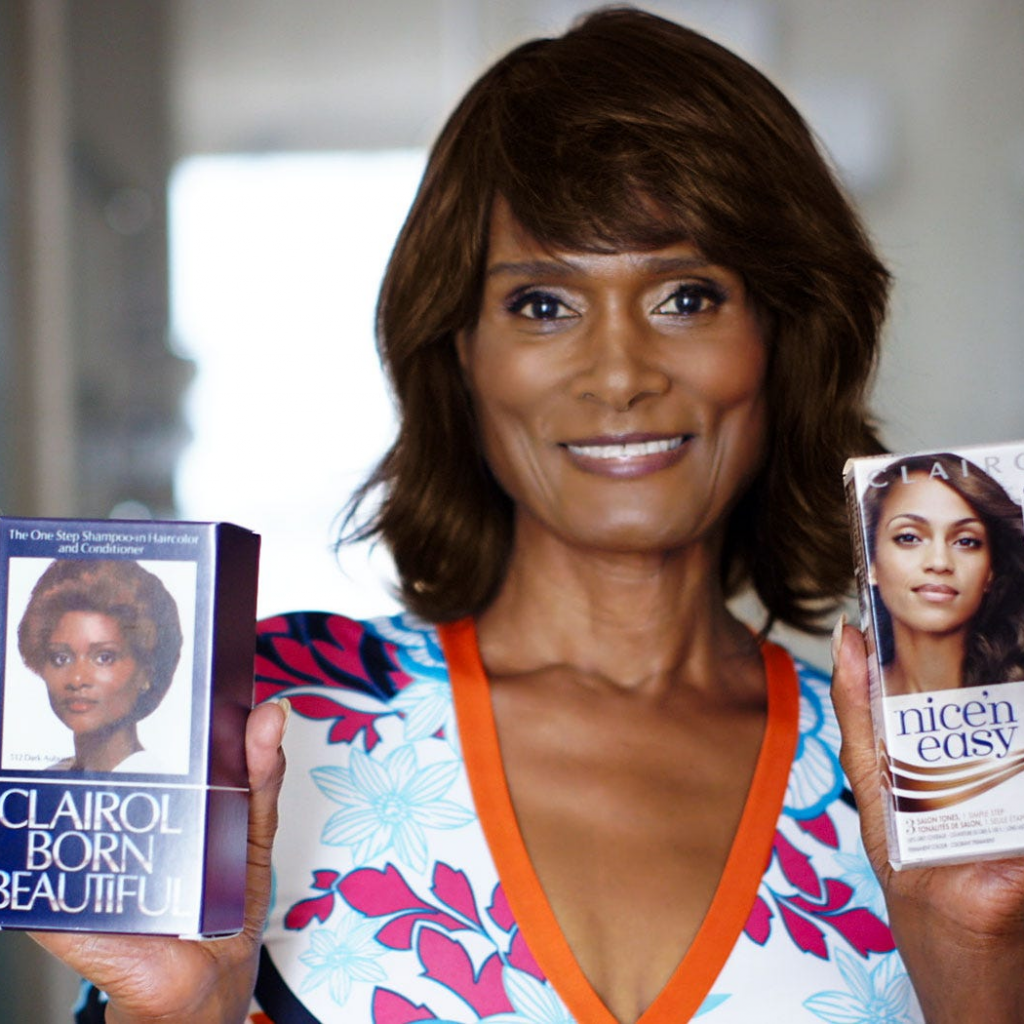Trans women have contributed to women’s history for centuries.
This Women’s History Month timeline honoring trans women’s achievements throughout history is a celebration of the lives and contributions of trans women worldwide. We will make updates to this guide annually; be sure to bookmark this resource.

TRANS WOMEN’S HISTORY MONTH TIMELINE
By Zarina Crockett and Daniela “Dani” Capistrano for TransLash Media
Many anti-trans people claim that the concept of being transgender is a recent development. What history has proven is that trans people have always existed; the “sudden” influx of out trans people online and offline is the heightened visibility of a community that has long been present, often hiding in plain sight in a world that doesn’t want us to exist.
For Women’s History Month and every month, we at TransLash honor trans women throughout history and their vast range of lived experiences. Explore our evolving timeline below and submit your tips for other history-making trans women we should add to this guide!
200 TO 300 B.C.
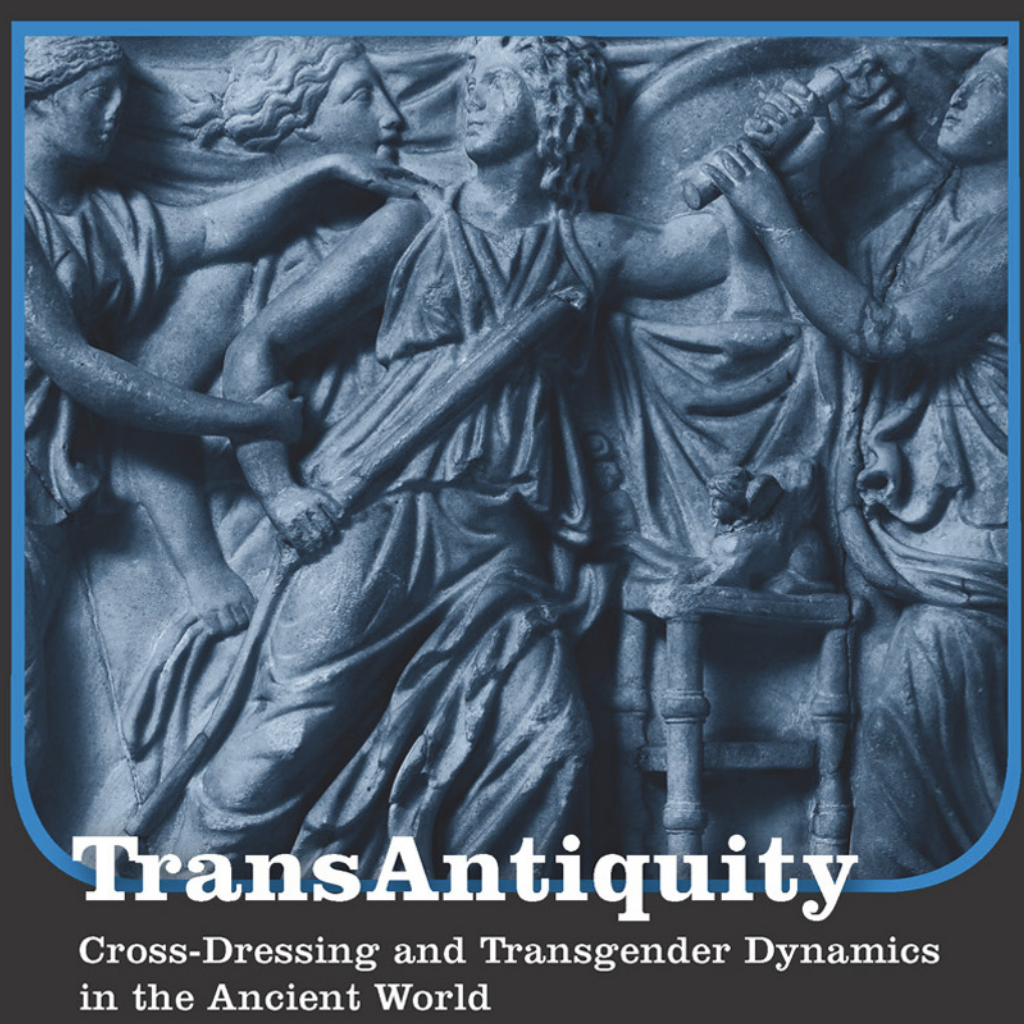
their literary and figurative representations in antiquity.
Sometime from 200 to 300 B.C., in ancient Greece, some gods were worshiped by galli priests who identified as women and have been identified by scholars as early transgender figures.
18TH CENTURY
Chevalier d’Éon (1728-1810)
Chevalier d’Éon was a distinguished French diplomat, spy, and soldier whose life story plays a crucial role in discussions on gender nonconformity in the 18th century. Referred to as “she” or “he” depending on the historical account you are reading, d’Éon spent the initial part of her career in male attire, engaging in espionage and diplomacy for King Louis XV, including negotiating the Treaty of Paris (1763).
However, d’Éon’s life took a dramatic turn when she started living as a woman in the latter half, asserting her female identity in a period when gender roles were rigidly defined. This transition sparked widespread public and scholarly debate, challenging contemporary notions of gender. d’Éon’s legacy as a figure of historical intrigue stems not only from her espionage and military achievements but also from her lived experience as a transgender individual, making her an emblematic figure in the pre-modern discourse on gender fluidity and transgender identity.
19TH CENTURY
Mary Jones (1803-1876)
Mary Jones was an African American trans woman who became a notable figure in the first records of transgender existence in the United States following her arrest in New York City in 1836. Her story, sensationalized by the press at the time, sheds light on the early presence and societal perceptions of transgender individuals in the 19th century.
Despite facing significant legal and social challenges, including being charged with grand larceny and subjected to public scrutiny and humiliation, Jones’ resilience and identity as a trans woman stand as an early testament to the struggles and visibility of transgender people during a period when understanding and acceptance were virtually nonexistent. Her story, preserved through court records and sensational newspaper accounts, offers valuable insight into the lives of trans individuals in the 1800s, making Mary Jones a pivotal figure in the historical narrative of trans resistance in the United States.
Frances Thompson (1840 – 1876)
Frances Thompson was an African American transgender woman and former slave whose remarkable courage and testimony before Congress marked a pivotal moment in the tumultuous aftermath of the Civil War. During the Memphis Riots of 1866, a series of violent attacks against Black communities, Thompson’s experience and subsequent testimony shed light on the brutal realities faced by African Americans and particularly highlighted the vulnerabilities of Black transgender individuals during this era.
Her brave account also provided one of the earliest documented instances of transgender existence, intersecting with racial and post-emancipation struggles in the United States. Despite facing immense personal risk, Thompson’s willingness to publicly share her story contributed to the broader understanding of the intersectional challenges faced by Black and transgender communities, making her a significant, though often overlooked, figure in the history of civil rights and transgender advocacy in the 19th century.
We’wha (1849-1896)
According to womenshistory.org, We’wha (pronounced WAY-wah) was a Zuni cultural ambassador and pottery and textile artist. Also a spiritual leader, We’wha endeavored to preserve the history, traditions, and knowledge of the Zuni people.
While there is no record of We’wha publicly identifying as a cisgender woman, and Lhamana/Two-Spirit identities are nuanced, the fact that newspaper headlines labeled We’wha an “Indian princess” and used she/her pronouns, is a public record of how non-Indigenous people have incorrectly clocked many Two-Spirit people as cisgender women throughout history.
We’wha was born in what is today New Mexico, where they took on both male and female tasks. We’wha’s sex was male, but they were recognized by their community as Two-Spirit as early as age three or four.
Since Lhamana/Zuni Two-Spirit individuals were recognized socially and culturally distinct from cisgender men and women during We’wha’s lifetime, the National Women’s History Museum determined the singular “they” to be most appropriate when sharing We’wha’s story.
In Zuni culture, Lhamana often wore women’s clothing and mostly took up labors associated with women. Lhamana constituted a socially-recognized third gender role within the tribe and often held positions of honor in the community.
Orphaned as an infant, likely as the result of a smallpox epidemic, We’wha and their brother were adopted by a paternal aunt. We’wha’s adopted family was wealthy and influential among the Zuni. Their position gave We’wha opportunities to gain special ceremonial knowledge and take part in revered cultural rituals.
We’wha became known for their talent as a craftsperson, during a period in which Pueblo textiles, particularly those in the distinctive Zuni style, flourished. We’wha was among the first Zuni to sell their pottery and textiles, helping to bolster Indigenous arts more widely.
The Zuni lived under threat of Navajo and Apache raids. In 1879, the U.S. government’s newly created Bureau of Ethnology sent an expedition to collect artifacts and record the customs of the Zuni people. The Bureau brought We’wha back with them to Washington, D.C. for six months.
Everyone in Washington believed We’wha to be a cisgender woman, so the visit resulted in a great deal of attention because women rarely participated in delegations.
We’wha mingled with Washington’s high society, even calling on President Grover Cleveland at the White House, where they presented Cleveland and his new wife, Frances, with a handcrafted wedding gift. Newspapers covered We’wha’s activities closely, reporting with great interest on the “Indian princess.”
But unfortunately name recognition did not stop the U.S. Office of Indian Affairs from extending its policy of assimilation to the Zuni and other Pueblo Indians in the years following We’wha’s return. Such policies furthered the dismantling of tribal culture – including pressure to abandon the recognition of lhamana individuals – and the absorption of Indians into Anglo society.
We’wha passed away in 1896, at the age of 49, as a result of heart disease. We’wha’s early death was considered a “calamity” among the Zuni.
We’wha left a profound legacy as a ceremonial leader, cultural ambassador, and artist who worked to preserve the Zuni way of life. While We’wha was not what 21st century historians would identify as a trans woman, the fact that they made history and headlines during that era as a “woman” is significant. We can honor We’wha’s Lhamana identity while including them in this Women’s History Month timeline.
Lili Elbe (1882 – 1931)
Lili Elbe was a pioneering figure in transgender history as the first “transsexual” in 1931 to receive a male-to-female “sex change” through gender-affirming surgery. Born in Denmark, Elbe initially gained recognition as a talented landscape painter under her deadname. However, her life took a transformative turn when she began living as Lili Elbe and underwent a series of groundbreaking gender confirmation surgeries in Germany.
Elbe’s transition was not only a deeply personal journey but also became a subject of widespread public interest and medical scrutiny, challenging societal norms and medical knowledge about gender identity and transition at the time.
In her autobiography Lili: A Portrait of the First Sex Change, Elbe described the moment that she donned a ballerina outfit as the catalyst for her transformation.
“I cannot deny, strange as it may sound, that I enjoyed myself in this disguise,” she wrote. “I liked the feel of soft women’s clothing. I felt very much at home in them from the first moment.”
Elbe’s story, courageously shared with the world, has left a lasting legacy, inspiring countless others and contributing to the understanding and acceptance of transgender individuals.
Tragically, Elbe died in 1931 due to complications from one of her surgeries, but her life and pioneering spirit continue to be celebrated for her significant impact on the transgender community and the fight for transgender rights and recognition.
Lucy Hicks Anderson (1886 – 1954)

Courtesy Museum of Ventura County
Lucy Hicks Anderson, an African American trans woman, is a pioneering figure in the history of transgender rights in the United States, known for her adamant stance on living authentically and fighting for her right to marry and exist freely as a woman. Born in Kentucky, Anderson identified and lived as a woman from an early age, becoming a well-known socialite and a respected chef in Oxnard, California. Her marriages, first in 1920 and later in 1944, were significant acts of personal truth that ultimately led to legal challenges when her gender assigned at birth was publicly disclosed.
In the face of adversity, including legal prosecution for perjury and fraud for marrying a man and receiving a wife’s military allotment, Anderson remained unwavering in her identity, famously stating, “I defy any doctor in the world to prove that I am not a woman.” Her life, marked by resilience and defiance against the restrictive norms of her time, has left an indelible mark on the history of transgender individuals’ fight for recognition and rights, making Lucy Hicks Anderson a celebrated and iconic figure in the transgender community.
20TH CENTURY
Christine Jorgensen (1926 – 1989)
Christine Jorgensen was an American transgender woman who gained international fame in the early 1950s as the first person widely known in the United States to undergo gender-affirming surgery. Born in the Bronx, New York, Jorgensen served in the U.S. Army during World War II before traveling to Denmark to undergo a series of gender confirmation procedures, a journey that was unheard of at the time in the U.S. Upon her return to the United States, Jorgensen’s story became a sensation, catapulting her into the spotlight and sparking a nationwide conversation about gender identity and transsexualism.
Her transition was a landmark event in the visibility and understanding of transgender individuals. Jorgensen used her newfound fame to advocate for transgender rights and acceptance, becoming a beloved and influential figure in the LGBTQ+ community. Through public appearances, lectures, and writing, she provided an early voice for transgender advocacy, challenging societal norms and paving the way for future generations of transgender individuals to live more openly and authentically.
April Ashley (1935 – 2021)

April Ashley was a pioneering figure in transgender history, recognized as one of the first Britons to undergo sex reassignment surgery. Born in Liverpool, England, Ashley transitioned in 1960 after undergoing surgery in Morocco, a bold move that set her on a path to becoming a successful model and actress. Her beauty and poise quickly caught the attention of the fashion world, and she graced the pages of Vogue, becoming an icon of elegance and femininity.
However, Ashley’s rising career faced an abrupt and challenging turn when a British tabloid outed her as a transgender woman in 1961, leading to widespread public scrutiny and the annulment of her marriage. Despite these adversities, Ashley remained steadfast, becoming an outspoken advocate for transgender rights and visibility. Over the years, she garnered numerous accolades for her contributions to the LGBTQ+ community, including being appointed a Member of the Order of the British Empire (MBE) for her advocacy work. April Ashley’s legacy is one of resilience, paving the way for greater acceptance and understanding of transgender individuals in society.
Lynn Conway (1938 – Present)

Lynn Conway is a distinguished American computer scientist, electrical engineer, and transgender activist. She is renowned for her work at IBM in the 1960s, where she invented generalized dynamic instruction handling, a key advancement in computer architecture that is used in out-of-order execution. This technique is employed by most modern computer processors to enhance performance.
Additionally, Lynn Conway, in collaboration with Carver Mead, initiated the Mead–Conway VLSI chip design revolution in very large scale integration (VLSI), which significantly impacted the field of microelectronics.
Wendy Carlos (1939 – Present)

Wendy Carlos is an iconic figure in the world of electronic music, celebrated worldwide for her groundbreaking contributions as a composer and musician. An American trans woman, her journey into the realm of electronic sound began with the release of Switched-On Bach in 1968, an album that transformed classical compositions by Johann Sebastian Bach through the innovative use of the Moog synthesizer, marking a pivotal moment in the genre’s history.
Carlos’s transition in the late 1960s, a personal journey undertaken with a degree of privacy, did not overshadow her professional achievements. She is renowned for her work on the scores of several major films, including Stanley Kubrick’s “A Clockwork Orange” and “The Shining,” as well as the original “Tron” film, blending classical sensibilities with electronic innovation to create soundscapes that have left an indelible mark on cinematic music.
Wendy Carlos’ pioneering spirit, both in her music and her life, continues to inspire and influence generations of musicians and composers, securing her legacy as a trailblazer in electronic music and a significant figure in the transgender community.
Jackie Shane (1940 – 2019)
Jackie Shane was an African American soul and rhythm and blues singer, who was most prominent in the local music scene of Toronto, Ontario, Canada, in the 1960s.
A pioneer transgender performer, Jackie Shane was a contributor to the Toronto Sound and is best known for the single “Any Other Way,” which was a regional Top 10 hit in Toronto in 1963 and a modest national chart hit across Canada in 1967.
Originally from Nashville, Tennessee, NPR reports that Shane’s had always known she was trans. Blessed with a supportive and loving mom, Jackie wore makeup and jewelry to school and when she started performing, onstage. It was through her traveling carnival gig that Jackie ended up in Cornwall, Ontario around the spring or summer of 1959 — and that’s where she felt at home. “I never felt that good before. I felt so free,” she told the Toronto musicologist Rob Bowman, who interviewed her at length for the liner notes to Any Other Way. “I just loved it.”
Shane was far from the Jim Crow South while in Canada, which she had resolved to leave. Throughout the ’60s, Shane blazed a path between Toronto and Los Angeles, where she drummed on sessions for the Bihari brothers’ Modern Records label. However, she abruptly left show business in 1971 to come back to the states and take care of her mother. Her identity as a trans woman was not confirmed on the record by a media outlet until music journalist Elio Iannacci interviewed her for The Globe and Mail in 2017. Shane died in her hometown of Nashville in 2019 at the age of 78.
Sir Lady Java (1943 – Present)
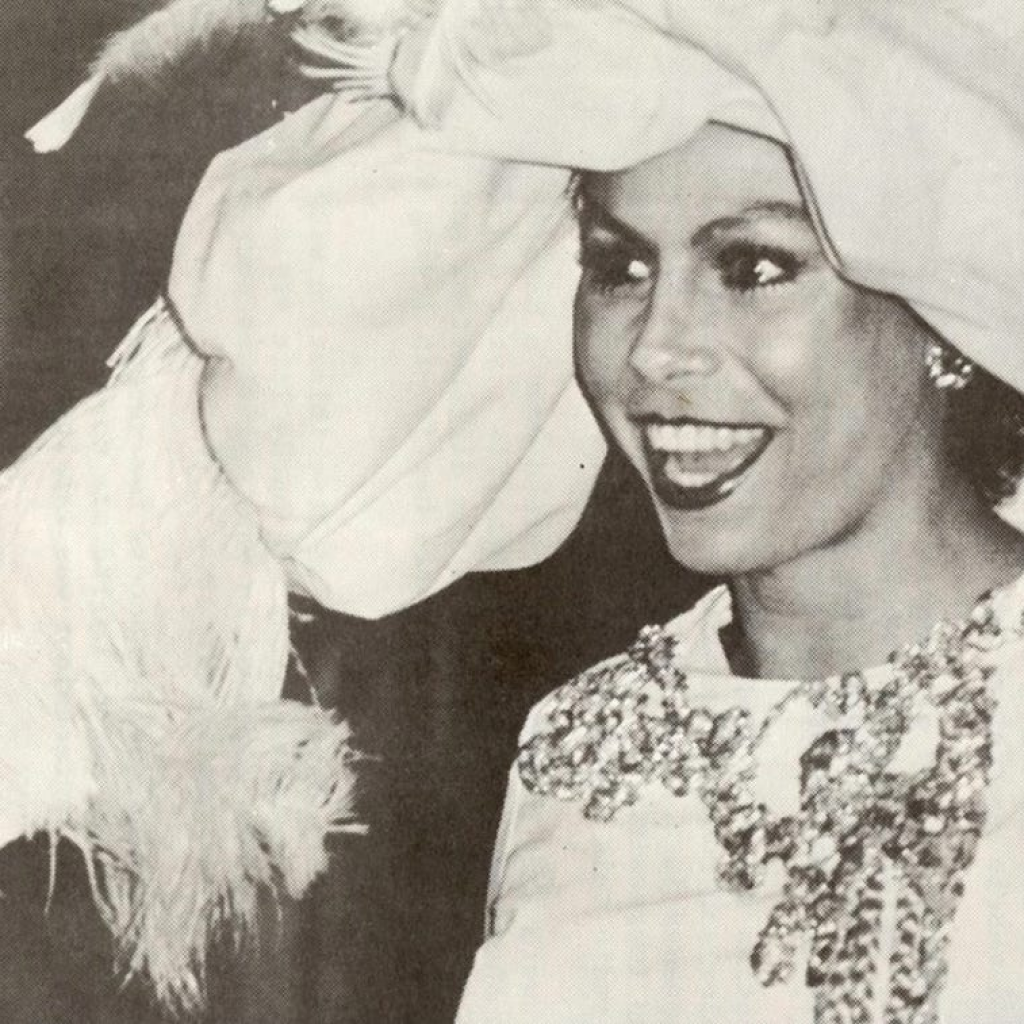
Sir Lady Java, an African American and native New Orleanian, emerged as a prominent activist and entertainer in the 1960s, known for her vibrant performances in Los Angeles’ nightclub scene and her courageous stand against discriminatory laws.
During a time when anti-crossdressing statutes were actively enforced to suppress LGBTQ+ expression, Sir Lady Java took a bold stance against Rule No. 9, a Los Angeles ordinance that prohibited performers from wearing clothing of the opposite gender. Her fight against this oppressive regulation, with the support of the American Civil Liberties Union (ACLU), marked a significant moment in the struggle for LGBTQ+ rights, challenging the legal system to reconsider its stance on gender expression and paving the way for future activism.
Although the courts initially did not rule in her favor, Sir Lady Java’s defiance and visibility brought attention to the injustices faced by the transgender community, making her a trailblazing figure in the fight for equality and acceptance. Her legacy continues to inspire activists and advocates, highlighting the importance of resistance and the fight for the right to live authentically.
Miss Major Griffin-Gracy (1940s – Present)
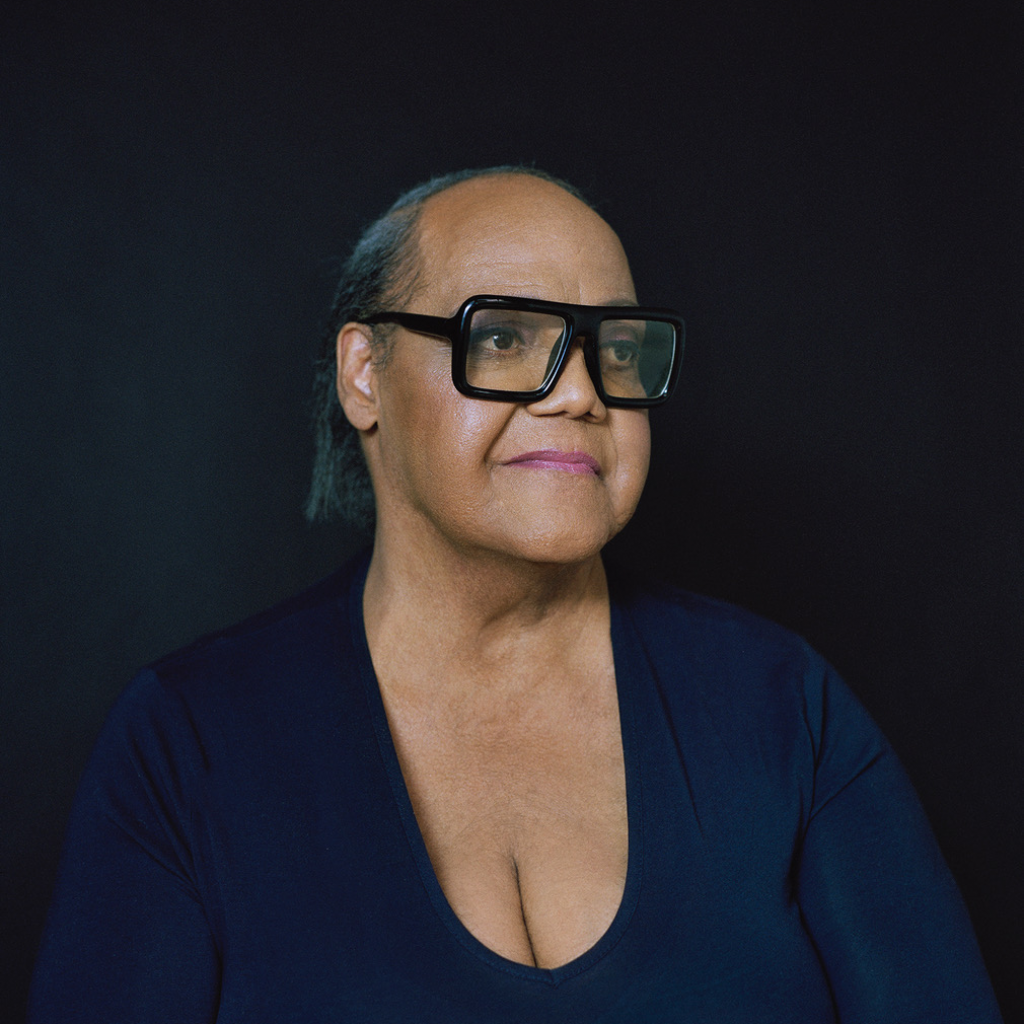
Miss Major Griffin-Gracy, an African American woman and parent, is a venerable figure in the fight for transgender rights, particularly known for her tireless advocacy on behalf of trans women of color. With a legacy of activism spanning over four decades, Miss Major’s life work has been dedicated to confronting and dismantling the systemic barriers and societal discrimination that transgender people face. As a survivor of the Stonewall Riots, her activism was galvanized by the pivotal 1969 uprising, leading her to become a guiding force in the transgender liberation movement.
Miss Major has served as the Executive Director of the Transgender Gender Variant Intersex Justice Project (TGIJP), an organization that advocates for the rights of trans people who are disproportionately affected by incarceration. Through her leadership, mentoring, and activism, Miss Major has not only provided direct support and advocacy for countless transgender individuals but has also fostered a broader awareness and understanding of the challenges and resilience of the transgender community. Her enduring commitment to justice and equality cements her status as an iconic and beloved figure within the LGBTQ+ rights movement.
You can follow Miss Major’s Instagram for updates on her activism and visit her website for more info.
Marsha P. Johnson (1945 – 1992)
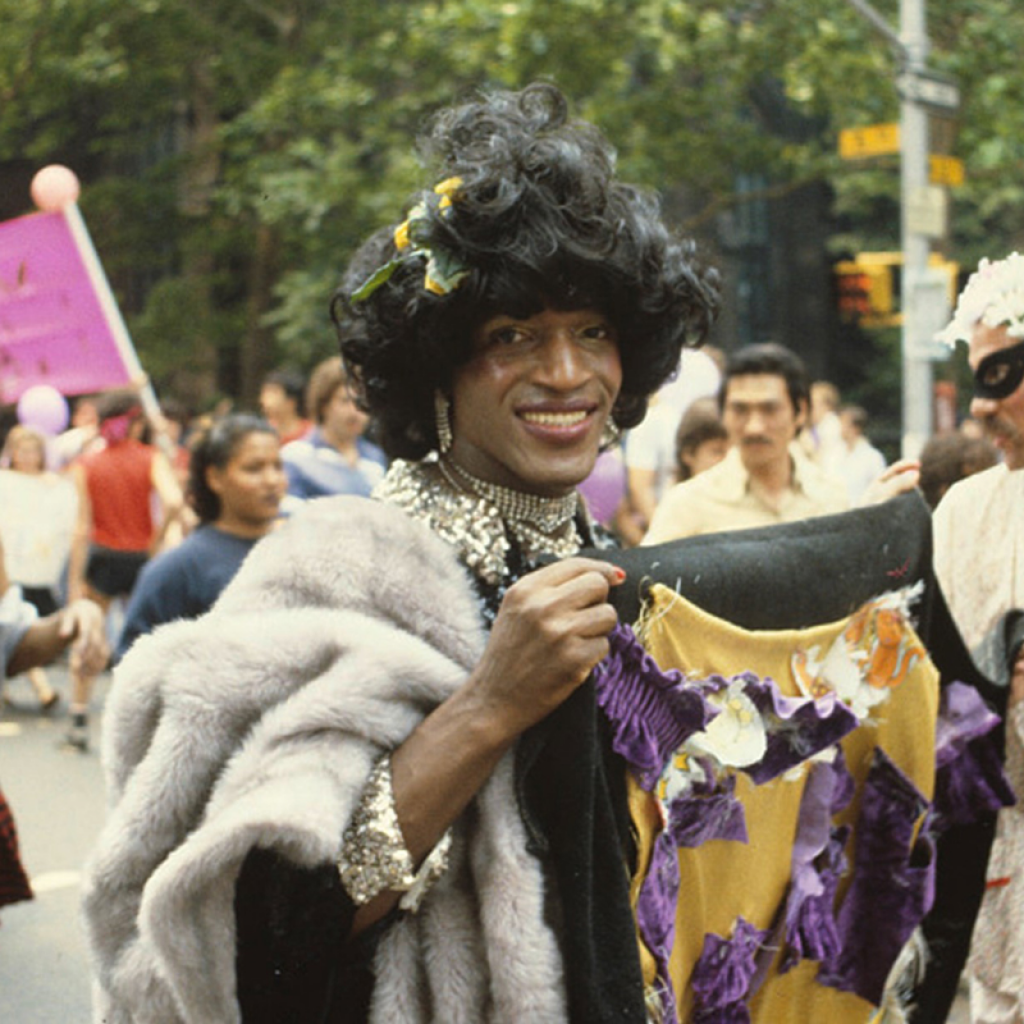
Marsha P. Johnson was an indelible force in the LGBTQ+ rights movement, an African American transgender woman and drag queen whose activism was rooted in unwavering courage and compassion. Most renowned for her pivotal role in the Stonewall uprising of 1969, Johnson’s resistance against police brutality and societal discrimination marked a turning point in the fight for LGBTQ+ rights.
Co-founder of the Street Transvestite Action Revolutionaries (STAR) alongside Sylvia Rivera, she dedicated her life to helping homeless transgender youth, advocating for the rights of the most marginalized within the community. Johnson’s infectious spirit and determination made her a beloved figure in New York City’s Greenwich Village and beyond, embodying resilience and solidarity in her advocacy. Her mysterious death in 1992 remains a symbol of the ongoing struggle against violence and prejudice faced by transgender individuals.
Marsha P. Johnson’s legacy continues to inspire new generations of activists, remembered as a saint of the modern LGBTQ+ rights movement.
Caitlyn Jenner (1949 – Present)

Caitlyn Jenner is an American retired Olympic gold medalist and media personality, widely recognized as one of the most famous transgender women globally. Jenner’s athletic prowess was showcased to the world during the 1976 Summer Olympics, where she won the gold medal in the decathlon, setting a world record and earning the unofficial title of “World’s Greatest Athlete.” Her transition, publicly revealed in 2015, marked a significant moment in the visibility of transgender individuals, bringing widespread attention to transgender issues.
Beyond her athletic and personal achievements, Jenner has also been a controversial figure due to her Republican political views that support anti-trans legislation. Her stance on various issues, including her support for right-wing conservative politics, has led to controversy, highlighting the complexity of her public persona and the diverse perspectives within the transgender community.
Follow Caitlyn on her Instagram for updates.
Sylvia Rivera (1951 – 2002)
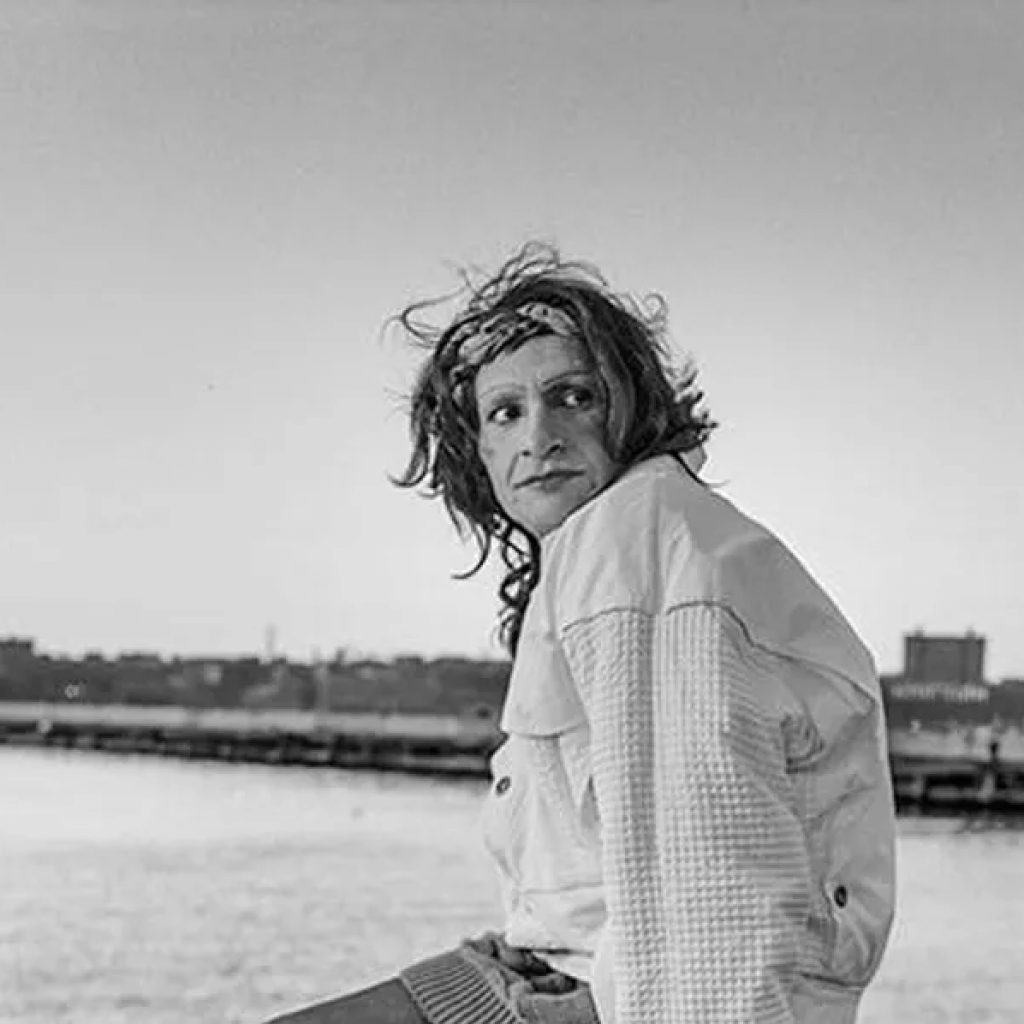
Sylvia Rivera was a trailblazing Latinx transgender activist renowned for her pivotal role in the LGBTQ+ rights movement. Born in New York City, Rivera’s activism ignited during the Stonewall uprising of 1969, where she stood at the forefront of the fight against police brutality and discrimination towards transgender people. A founding member of both the Gay Liberation Front and the Gay Activists Alliance, Rivera dedicated her life to advocating for the rights of transgender individuals, particularly those marginalized within the LGBTQ+ community due to their gender identity and economic status.
Alongside her close friend Marsha P. Johnson, Rivera co-founded STAR (Street Transvestite Action Revolutionaries), an organization aimed at supporting homeless transgender youth in New York. Rivera’s legacy endures as a symbol of resilience and unyielding advocacy for the inclusion and recognition of transgender rights within the broader LGBTQ+ rights movement.
Tracey “Africa” Norman (1952 – Present)
Tracey “Africa” Norman is known for being a pioneering African American transgender model who emerged in the 1970s, breaking significant barriers in the fashion industry. Norman’s career took off when she was unexpectedly discovered and subsequently featured on a Clairol hair color box, becoming the first Black trans model to achieve such a feat without publicly disclosing her transgender identity at the time. Her work extended to various high-profile fashion magazines and runways, but her career faced challenges upon being outed.
Despite these setbacks, Norman’s resilience and pioneering spirit have made her an iconic figure, and her legacy continues to inspire the LGBTQ+ community and the fashion world alike, celebrating her contributions and the path she paved for future generations of transgender models.
Follow Tracey “Africa” Norman on her Instagram and Facebook for more updates.
Martine Rothblatt (1954 – Present)

Martine Rothblatt is a pioneering force across a multitude of cutting-edge fields including satellite communications, pharmaceuticals, digital technologies, and more. An American entrepreneur and founder of SiriusXM, Rothblatt revolutionized radio broadcasting before turning her focus to the biotech realm with the establishment of United Therapeutics. Her involvement in seminal projects such as the Human Genome Project highlights her dedication to advancing life sciences.
Beyond her technological and scientific endeavors, Rothblatt’s work in sustainable building practices and electric aviation showcases her commitment to environmental sustainability. A noted advocate for transgender rights, Rothblatt’s influence also encompasses significant contributions to medical and pharmaceutical innovations.
Her groundbreaking journey is further illuminated in the 2024 documentary Love Machina, where futurists Martine and Bina Rothblatt design humanoid AI Bina48 to transfer Bina’s consciousness into a robot, aiming to immortalize their extraordinary love for all eternity.
Fore more information on Martine Rothblatt, visit this website.
Marci Bowers (1958 – Present)
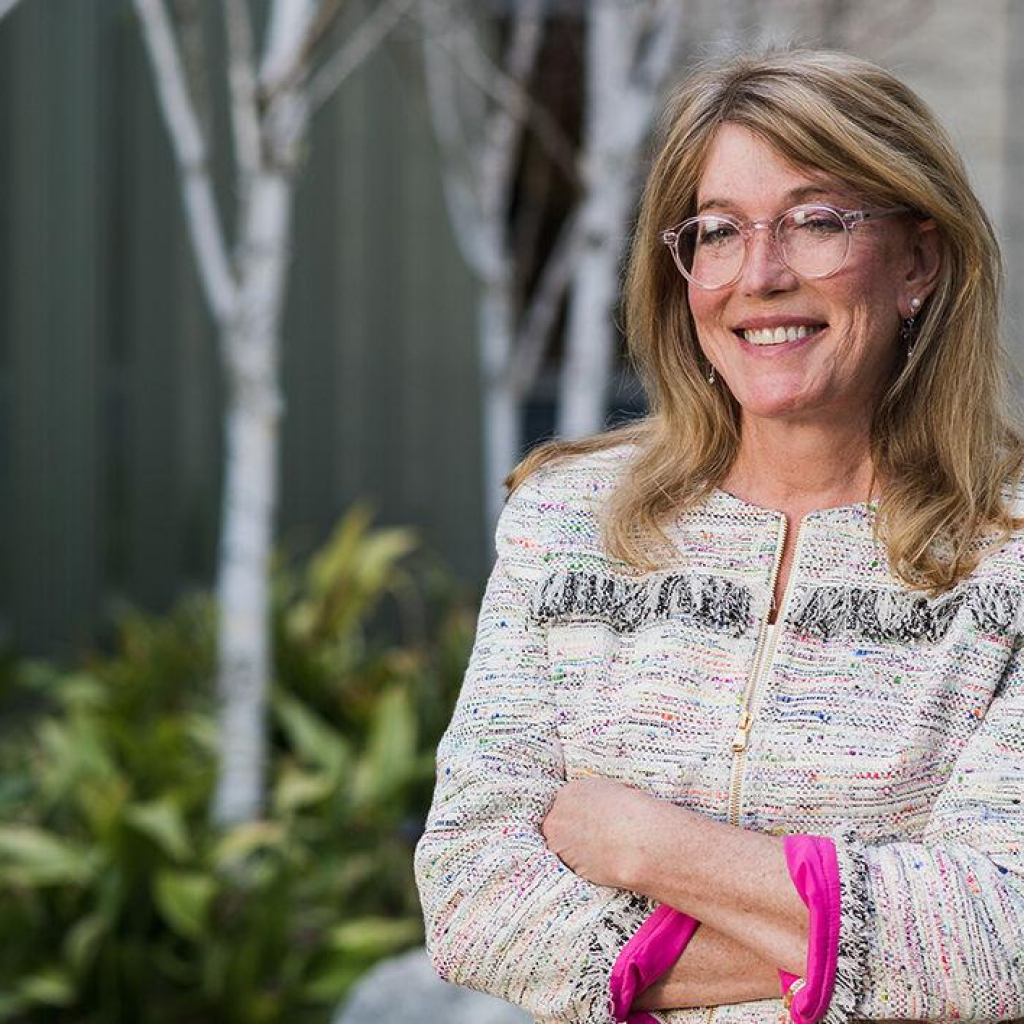
Marci Bowers is a trailblazer in the field of gender-affirming surgery. An American gynecologist and surgeon, Marci is recognized as the first woman and first trans person to perform MTF/FTM genital surgeries. Bowers has made significant contributions to the medical field, including performing the first live surgical vaginoplasty surgeries in educational programs and being the first U.S. surgeon to perform clitoral restoration surgery for survivors of female genital mutilation. Her work has not only advanced the surgical techniques but also provided hope and healing for many in the trans community and beyond.
For more information about Marci Bowers’ legacy and work, visit her website.
Lorena Borjas (May 29, 1960 – March 30, 2020)
Lorena Borjas, a transgender Latina activist who fought for immigrants and sex workers, died of Covid-19 in 2020.
According to CNN, even as Lorena Borjas was feeling ill and waiting on Covid-19 test results, she was worried about how transgender immigrants would cope with the pandemic.
Borjas, a transgender Latinx activist from Queens who spent decades advocating for people from marginalized communities, overcame numerous challenges and traumas she faced in her personal life, all while fighting for transgender women, undocumented immigrants, sex workers and those living with HIV/AIDS.
Lorena’s passion for this work, which she did for many years without any support, stems from her own experiences of being trafficked.
Borjas was like a mother to Cecilia Gentili. “You could aspire to be like her but you clearly know you won’t be like her because you are not as selfless as she is,” Gentili told CNN.
Monica Roberts (May 4, 1962 – October 5, 2020)
In 2020, TransLash honored Monica Roberts, an African American trans blogger, writer, and transgender rights advocate. She was the founding editor of TransGriot, a groundbreaking blog focusing on issues pertaining to trans women, particularly Black and other women of color.
Roberts’ coverage of transgender homicide victims in the United States is credited for bringing national attention to the issue.
TransLash Media stands on the shoulders of Monica Roberts, and we at TransLash continue to honor Roberts’ legacy.
Amanda Lepore (1967 – Present)
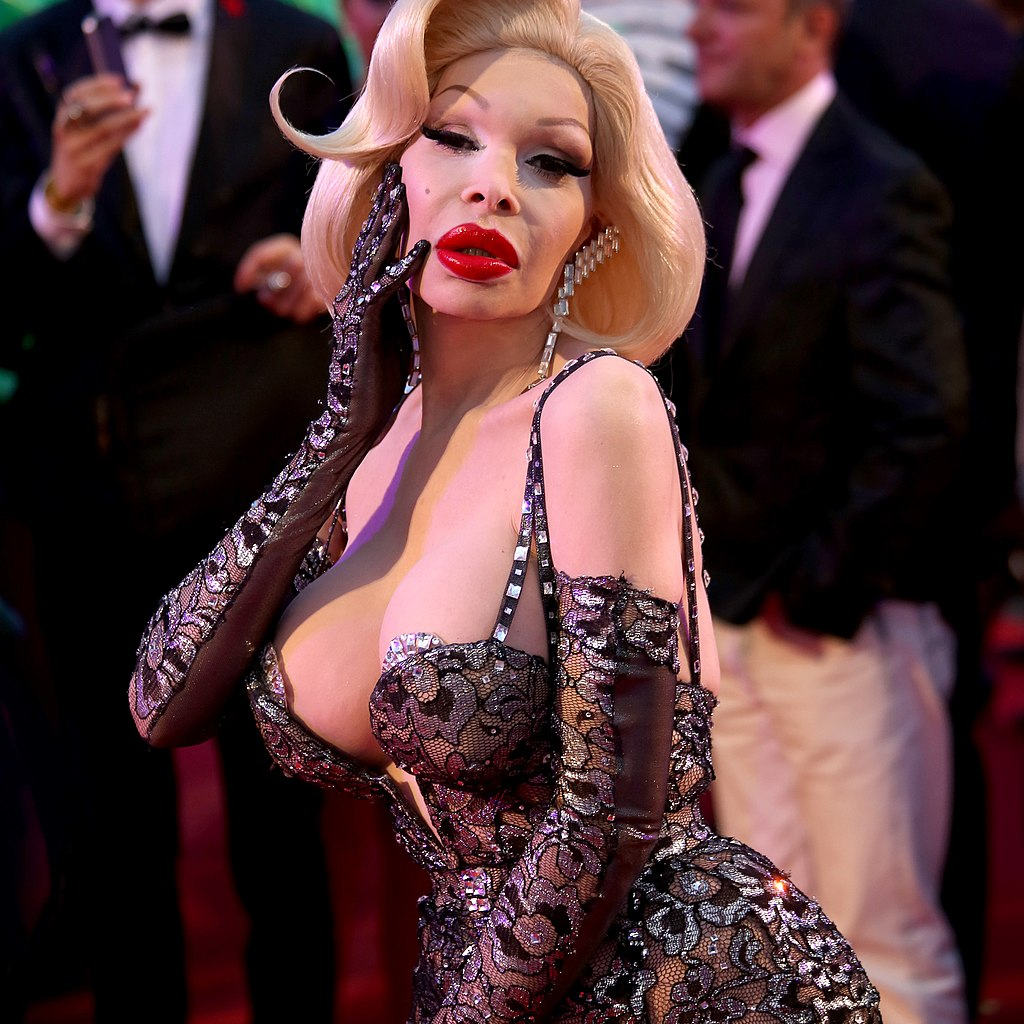
Amanda Lepore is a quintessential icon in the worlds of fashion, music, and performance art, celebrated for her flamboyant presence and undeniable impact on the transgender community. As one of the most recognizable trans personalities globally, Lepore’s journey began with her early transition, which set the stage for a career that would intertwine her personal narrative with her artistic expressions. Her bold, glamorous style and unapologetic self-expression have made her a muse for photographers and artists alike, including David LaChapelle, with whom she has collaborated extensively.
Lepore’s contributions extend beyond the visual arts into music, where her singles and albums encapsulate the essence of club and pop culture. Beyond her artistic achievements, Amanda Lepore stands as a beacon of resilience and empowerment for the transgender community, embodying the triumph of authenticity over adversity. Her life and work continue to inspire and challenge societal norms around beauty, gender, and identity, making her a beloved figure and a true pioneer in the ongoing dialogue about transgender visibility and rights.
Follow Amanda Lepore on her Instagram and get more information on her website.
Aya Kamikawa (1968 – Present)

Aya Kamikawa is the first openly transgender person to seek or win elected office in Japan. She was elected as municipal official to Tokyo in 2003. When submitting her election application papers it is noted that she left a blank space for “sex.”
Despite the Japanese government announcing that they would continue to see her officially as male, Kamikawa stated she would work as a woman. She was re-elected in 2007 for a second four-year-term seat. Aya uses her official position to improve rights for women, children, the elderly, handicapped and LGBTQ people.
In 2012 Former United States Ambassador John V. Roos gave Aya Kamikawa a certificate recognizing her nomination for the Secretary of State’s Women of Courage Award. Kamikawa had helped to develop a sexual minority awareness curriculum for Setagaya schools and advocated on the national level for an improved legal framework for transgender people.
During a 2013 discussion, Kamikawa shared, “I decided not to pretend to be an ordinary male anymore, but try to be who I truly am. I changed my gender, the reason was because I knew that I was different and I could feel that between my body and heart there was no harmony. But it wasn’t easy at all, it is thanks to my father who encouraged me by telling me to do whatever I think is right.”
Aya Kamikawa is featured in Queer Japan, a 2019 documentary film directed, edited, and co-written by Graham Kolbeins. Queer Japan is produced by Hiromi Iida with Anne Ishii and written by Ishii and Kolbeins.
Laverne Cox (1972 – Present)

Laverne Cox is a groundbreaking African American actress and transgender advocate renowned for her role in “Orange Is the New Black.” She has marked her place in history as the first transgender person to be nominated for a Primetime Emmy in an acting category, to have a wax figure at Madame Tussauds, and to appear on the cover of Time magazine, amplifying her role as a leading voice for transgender representation and rights.
Further cementing her status as a cultural icon, Cox became the first transgender woman to be celebrated with her own Barbie doll, an honor that symbolizes the strides made toward inclusivity and visibility for transgender people in all areas of society, from entertainment to children’s toys. Through her achievements and advocacy, Cox has not only advanced transgender visibility but also inspired countless individuals with her message of equality and acceptance.
Follow Laverne Cox on her Instagram or visit her website for more updates.
Cecilia Gentili (1972 – 2024)

Cecilia Gentili, an Argentine American icon, dedicated her life to the rights of transgender people and sex workers. She held significant roles in LGBTQ HIV/AIDS care nonprofits and founded Trans Equity Consulting. Her activism led to the decriminalization of sex work in New York and the repeal of discriminatory laws.
Gentili passed away on February 6, 2024, leaving behind a legacy of tireless advocacy for marginalized communities.
You can follow the late activist’s Instagram for updates from her family.
D. Smith (1975 – Present)
D. Smith was born to a religious family in Miami, Florida, where she fell in love with music through church. She wrote her first song at ten years old for her church choir. By seven years old, she knew was trans.
Today, Smith is an African American two-time Grammy nominated producer, singer, and songwriter who made her film debut as a director of the documentary KOKOMO CITY (2023). The film premiered to overwhelming praise at Sundance last year, and was her reintroduction to the public eye after the music industry turned its back on her in 2014, when she came out as transgender.
As a producer, Smith produced “Shoot Me Down” for Lil Wayne’s Carter III album which went 8 times platinum. Smith then signed a major publishing deal with Universal Music. She has produced and written for Cee-lo Green, Estelle, Katy Perry, Andre 3000, Monica, Lloyd, Fantasia, Nipsey Hussle, Ciara, Neyo, and Billy Porter. She has also collaborated with super producers like Timbaland and Marc Ronson.
Follow D. Smith on Instagram: @truedsmith
Madison Hinton (1977 – Present)

Madison Hinton, also known as Maddie, is a multifaceted African American entertainer, entrepreneur, recording artist, and fervent LGBT activist renowned for her vibrant internet personality and outspoken advocacy for the rights and visibility of the LGBT community. As an openly transgender woman, Hinton has utilized her platform to address critical issues affecting transgender individuals, leveraging her widespread influence to foster a more inclusive and understanding society. Her artistic endeavors include the release of an EP, showcasing her talents and diversifying her contributions to entertainment beyond her digital presence.
Hinton’s commitment to sharing her journey and insights is exemplified in her autobiography, offering an intimate look into the challenges and triumphs of navigating life as a transgender individual. Through her activism, artistry, and entrepreneurship, Madison Hinton embodies the spirit of resilience and advocacy, making significant strides in the fight for equality and acceptance for the LGBTQ+ community.
Follow Maddie on her official Instagram or check out her website for updates and more info.
Angelica Ross (1980 – Present)

Angelica Ross, is an African American actress, businesswoman, and transgender rights advocate. She is best known for her compelling roles in groundbreaking series “Pose” and “American Horror Story,” where her performances have garnered critical acclaim and a significant following.
Beyond her acting career, Ross is the visionary founder and CEO of TransTech Social Enterprises, an innovative organization dedicated to creating employment opportunities for transgender individuals in the technology sector. Her multifaceted contributions to both the entertainment industry and the advancement of transgender rights underscore her impact as a leading figure in advocating for inclusivity and change.
Follow Angelica Ross on her Instagram or visit her website.
Janet Mock (1983 – Present)

Janet Mock is an influential African American writer, television producer, and transgender rights activist renowned for her compelling advocacy and significant contributions to the media industry. Rising to prominence with her bestselling memoir, “Redefining Realness,” Mock’s work has been pivotal in bringing transgender issues to the forefront of societal discourse, challenging conventional narratives and advocating for a more inclusive understanding of gender identity. Her role as a producer and writer for the critically acclaimed FX television series “Pose” further cemented her status as a trailblazer in the entertainment industry, showcasing the lives and challenges of transgender people during the late 20th century.
Beyond her literary and production achievements, Mock’s voice has been instrumental in shaping public policy and attitudes towards transgender rights, making her one of the most respected and influential figures in the fight for LGBTQ+ equality. Through her work, Mock continues to inspire and empower countless individuals within and beyond the transgender community, embodying the possibilities of living authentically and pursuing justice for marginalized voices.
Follow Janet Mock on her Instagram and visit her website.
Danica Roem (1984 – Present)

Danica Roem has made significant contributions as the first openly transgender person to be elected and serve in the Virginia House of Delegates and later in the Virginia Senate. Her career spans journalism and politics, where she has been a vocal advocate for LGBTQ+ rights, transportation issues, and healthcare.
Follow Danica Roem on Instagram or visit her website.
Andreja Pejić (1991 – Present)

Andreja Pejić is a Australian model known for her striking androgynous appearance and her significant contributions to the fashion industry. Born in Bosnia and Herzegovina, Pejić fled to Serbia with her family during the Bosnian War before eventually settling in Australia. She began her modeling career in 2007 and quickly gained international recognition for her unique look, walking both men’s and women’s runway shows for top designers such as Jean-Paul Gaultier, Marc Jacobs, and Jeremy Scott.
In 2015, Pejić made history by becoming the first openly transgender model to be profiled by Vogue, a groundbreaking moment for transgender visibility in the fashion world. Her journey and success have inspired countless individuals within the LGBTQ+ community. Pejić continues to be a prominent figure in the modeling industry, advocating for greater diversity and inclusion.
Follow Andreja Pejić’s career and inspiring journey on her Instagram: @andrejapejic
Raquel Willis (1991 – Present)

Raquel Willis is an influential African American writer, editor, and transgender rights activist renowned for her tireless advocacy and significant contributions to the transgender community. As the former national organizer for the Transgender Law Center, Willis has played a crucial role in advancing the rights and protections of transgender individuals across the United States.
Her powerful writing and activism have earned her numerous accolades, including the prestigious GLAAD Media Award for Outstanding Magazine Article in 2020, being named one of The Root’s 100 Most Influential African Americans in 2019, and being featured on Essence’s Woke 100 list in 2019.
In November 2023, Willis released her highly anticipated memoir, The Risk It Takes To Bloom, which offers an intimate and inspiring account of her journey as a Black transgender woman navigating self-discovery, love, and resilience. Through her unwavering commitment to justice and equality, Raquel Willis continues to be a driving force in the fight for transgender rights and a beacon of hope for LGBTQ+ individuals everywhere.
To stay connected with Raquel Willis and support her ongoing work, follow her on Instagram (@raquel_willis) and visit her website (raquelwillis.com).
Hari Nef (1992 – Present)

Hari Nef has solidified her status as a trailblazing figure in the entertainment industry and a prominent advocate within the transgender community. An American actress, model, and writer, Nef broke new ground as one of the first openly transgender women to be signed by a major modeling agency, IMG Models, and captivated audiences with her role as Gittel in the Amazon original series “Transparent.”
Her contributions to transgender visibility and representation were further amplified by her participation in the highly anticipated “Barbie” movie, showcasing her versatility and appeal across various media platforms. Beyond her achievements in acting and modeling, Nef’s insightful essays and public advocacy provide a powerful voice for transgender rights and issues, challenging societal norms and fostering a deeper understanding of gender identity.
Follow Hari on her Instagram for more updates.
Erika Santos Silva / Erika Hilton (1992 – present)
Erika Hilton is a Brazilian politician, LGBTQ activist and former sex worker. Discrimination and violence against LGBTQ+ communities in Brazil are widespread and the country has the highest levels of violence against trans people in the world.
In the face of this stark reality, Erika Hilton became the first transgender councillor elected in the city of São Paulo in 2020, rallying against transphobia, homophobia and racism.
In November 2021, Erika was honored with a “Generation Change Award” at the 2021 MTV Europe Music Awards in Budapest.
In 2022, Erika Hilton and Duda Salabert became the first two openly transgender people elected to the National Congress of Brazil, with both of them elected to its Chamber of Deputies. Hilton was honored as one of the BBC 100 Women in December 2022.
Follow Erika Hilton on Instagram: @hilton_erika
Hunter Schafer (1998 – Present)

Hunter Schafer is a talented American actress, model, and passionate LGBTQ rights activist. She rose to prominence with her breakout role as Jules Vaughn in the critically acclaimed HBO series “Euphoria,” where her powerful performance has garnered widespread praise. Born in Raleigh, North Carolina, Schafer has been a vocal advocate for transgender rights and has used her platform to raise awareness about issues facing the LGBT community.
Before her acting debut, she made a name for herself in the modeling industry, working with renowned brands such as Dior, Miu Miu, and Calvin Klein. Schafer’s dedication to her craft and commitment to activism have made her an inspiration to many.
To keep up with Hunter Schafer’s latest projects and join her in advocating for LGBTQ rights, follow her on Instagram (@hunterschafer).
21ST CENTURY
Jazz Jennings (2000 – Present)

Jazz Jennings is an inspiring American YouTube personality, spokesmodel, television personality, and LGBTQ rights activist. As a young trans woman, Jennings bravely shared her story with the world when she was still a child and has since become a powerful advocate for transgender rights and visibility. She starred in the groundbreaking TLC reality series “I Am Jazz,” which offered an intimate look into her life as a trans teenager.
Jennings has been featured across various media platforms, including interviews and documentaries, and has authored a poignant memoir titled Being Jazz: My Life as a (Transgender) Teen. Her tireless advocacy work has earned her prestigious accolades, such as the Trevor Project’s Youth Innovator Award in 2013 and recognition as one of Time Magazine’s Most Influential Teens in 2014 and 2015.
Alongside her activism, Jennings has made strides in the modeling industry, partnering with brands to champion diversity and inclusion.
To stay connected with Jazz Jennings, follow her on Instagram (@jazzjennings_), YouTube (Jazz Jennings), and Facebook (Jazz Jennings).
Aaron Rose Phillip (2001 – Present)

Aaron Rose Phillip is a trailblazing Antiguan-American model and activist. Raised in the Bronx, New York, Philip is the first Black, transgender, and disabled model to be represented by a major agency, Elite Model Management. She has been featured in campaigns for brands such as Sephora, Dove, and Moschino. Philip has used her platform to advocate for greater representation and inclusion in the fashion industry, particularly for individuals who are transgender, disabled, and people of color. Her inspiring journey and activism has been covered by numerous media outlets, including Vogue, The New York Times, and CNN.
As a prominent voice in the fight for equality, Philip continues to break barriers and challenge societal norms.
To support Aaron Rose Philip, follow her on Instagram (@aaron___philip).
Zaya Wade (2007 – Present)

Zaya Wade is an inspiring young African American activist. As the daughter of former NBA player Dwyane Wade and actress Gabrielle Union, Zaya has bravely used her platform to speak out about her experiences as a transgender teenager.
With the loving support of her family, she has become a role model for LGBTQ+ youth by promoting self-love, acceptance, and understanding. Zaya’s courage and determination to live authentically have earned her admiration and respect from people around the world. Her advocacy work is helping to create a more inclusive and compassionate society for all individuals, regardless of their gender identity.
Follow Zaya Wade on Instagram for more updates: @zayawade
Did you find this Women’s History Month resource helpful? Consider supporting TransLash today with a tax-deductible donation. Did we miss anything? Let us know and we’ll update the guide with your suggestion, crediting you as the contributor.

![Charles d'Éon de Beaumont or Charlotte d'Éon de Beaumont[a] (5 October 1728 – 21 May 1810)](https://translash.org/wp-content/uploads/2024/02/image-10-1024x1024.png)

